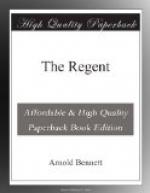Rose Euclid began to blush.
“That bit you taught me the day before yesterday?”
“Only the three lines! No more! They are the very essence of poetry—poetry at its purest. We’ll see the effect of them on Mr. Machin. We’ll just see. It’s the ideal opportunity to test my theory. Now, there’s a good girl!”
“Oh! I can’t. I’m too nervous,” stammered Rose.
“You can, and you must,” said Carlo, gazing at her in homage. “Nobody in the world can say them as well as you can. Now!”
Rose Euclid stood up.
“One moment,” Carlo stopped her. “There’s too much light. We can’t do with all this light. Mr. Machin—do you mind?”
A wave of the hand and all the lights were extinguished, save a lamp on the mantelpiece, and in the disconcertingly darkened room Rose Euclid turned her face towards the ray from this solitary silk-shaded globe.
Her hand groped out behind her, found the table-cloth and began to scratch it agitatedly. She lifted her head. She was the actress, impressive and subjugating, and Edward Henry felt her power. Then she intoned:
“Brightness falls from the air;
Queens have died young and fair;
Dust hath closed Helen’s eye.”
And she ceased and sat down. There was a silence.
“Bra vo!” murmured Carlo Trent.
“Bra_vo_!” murmured Mr. Marrier.
Edward Henry in the gloom caught Mr. Seven Sachs’s unalterable observant smile across the table.
“Well, Mr. Machin?” said Carlo Trent.
Edward Henry had felt a tremor at the vibrations of Rose Euclid’s voice. But the words she uttered had set up no clear image in his mind, unless it might be of some solid body falling from the air, or of a young woman named Helen, walking along Trafalgar Road, Bursley, on a dusty day, and getting the dust in her eyes. He knew not what to answer.
“Is that all there is of it?” he asked at length.
Carlo Trent said:
“It’s from Thomas Nashe’s ‘Song in Time of Pestilence.’ The closing lines of the verse are:
’I am sick, I must die—
Lord, have mercy on me!’”
“Well,” said Edward Henry, recovering, “I rather like the end. I think the end’s very appropriate.”
Mr. Seven Sachs choked over his wine, and kept on choking.
III
Mr.. Marrier was the first to recover from this blow to the prestige of poetry. Or perhaps it would be more honest to say that Mr.. Marrier had suffered no inconvenience from the contretemps. His apparent gleeful zest in life had not been impaired. He was a born optimist, of an extreme type unknown beyond the circumferences of theatrical circles.




